It’s
never easy when you capture the world’s attention fully in your first
shot – because no matter how well you do, people will give you a hard
time when you try to follow it up.
Vanessa Carlton knows this. Her first single “A Thousand Miles” in 2002
became a monster hit – saturating the airwaves and still getting played
regularly to this day. With its distinctive piano melody the song took
up residence in the American pop cultural lexicon.
She has since had a few other big hits – such as the follow-up “Ordinary
Day,” a duet cover of Joni Mitchell’s classic “Big Yellow Taxi” with
rock group Counting Crows and the lovely (but
inexplicably controversial) “White Houses.”
Now with “Hands on Me” – her second release from her terrific
recent album Heroes and Thieves –
Carlton has delivered her best single yet, a song that with a little
label and radio TLC could and should be a
smash.
Carlton called us from the road while touring with troubadour Joshua
Radin to discuss her life, her career, her favorite
movies and her surprising attraction to
vampires.
I read that you first got interested in music at Disneyland. Is that
true? How did you first get into music?
My mother is a pianist and a piano
teacher, so her theory is that she played throughout her pregnancy, so that’s why I became a musician.
She’s a little out there with her theories,
though they are very charming. There were
pianos all over my house. There was really no way to avoid playing
piano. The Disneyland story is really that I was very much haunted by
the melody of “It’s a Small World.” I don’t know if you know that song,
but it’s kind of like “Children of the Dead” or “Children of the Night.”
It’s like this creepy zombie children’s song. The ride scared
the bejesus out of me. I just thought it was the spookiest, most
horrific thing ever, but at the same time, anything that really scares
me in my life, I kind of obsess about. So when I
got back from Disneyland - I don’t remember this, but I’m maybe
almost three years old and the story goes I just picked out the melody
on a piano, so my mom instantly probably thought I was a genius or
something. (laughs) Then she
totally honed in on teaching me. So I started playing around three –
I’m sure just banging and finger picking, but that was the beginning.
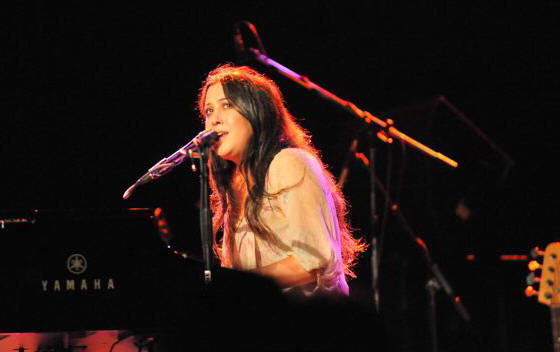 Your
mother is a pianist and teacher. Do you think artistic temperament can
be passed down in families?
Your
mother is a pianist and teacher. Do you think artistic temperament can
be passed down in families?
That’s a good interesting question,
because I do have some friends and they are artists and their parents
are very conservative. In a sense for the artist, growing up in a
household that’s very non-artistic, it can almost feel oppressive if the
parents aren’t able to understand or support that kind of lifestyle.
Sometimes it’s looked down upon – especially when you’re not making any
money. It’s tricky. But at the same time, I also know parents that are
very bohemian and artistic and alternative and supportive and the kids
rebel and they become very involved in the sciences instead. So I don’t
know. There’s no real rhyme or reason to it. I do know that no matter
what, I’d like to think that I would have found music… I would have done
something in the arts, no matter what. I was really on track to be a
ballet dancer. That’s really what my great passion was for many, many
years. Music was kind of something I did as a hobby in the background
to just comfort myself outside of the world of ballet. But, the minute
you asked me that, I thought of Mary Shelley, who obviously wrote
Frankenstein. I was just reading that
book a couple of weeks ago and her father was a philosopher and
scientist. She ended up incorporating the science into her art. So
there must be some passing down of the genes or the DNA is obviously
going to be passed down. But, there’s got to be some conditioning that
goes on for all offspring.
When you were in your teens you started recording an album called
Rinse, which was never released
– although several of the songs showed up later on
Be Not Anybody. Was it
disappointing when the disk was never released, and looking back do you
feel it was best for your long-term music career?
Well, it was the same record. All the
same songs, it’s just the other arrangements were more alternative.
I mean, I haven’t even listened to that album in so
long. It was a stepping stone to getting to Interscope, I
suppose, in a way. You know, I have no regrets, because I feel like whatever path that I have chosen has led to this particular
intersection that I’m in at in my life. I feel pretty healthy and more
self-aware than I’ve ever been. I’m the most excited about my work and
still very present and inspired. I’m so relieved that I’m not the
jaded, robotic chick.
In your recent single, “Nolita Fairytale,” you discuss putting aside the
glitz and glamour and being more true to yourself and the simple
pleasures. Does that reflect where you are in your life and career?
Yeah, and I aspire to. I have to
remind myself of that every day. I’m certain with glitz and glamour,
that really has nothing to do with my life. It’s very
compartmentalized. The last chapter in Heroes and Thieves
is called “More Than This.”
That’s
really what I struggle with, this idea that if you were able to declare
in the moment that you are in that you need no more than what you have,
you can instantly be blissfully content. There are so many wonderful,
magical things that go on in my life that sometimes if you’re not
present, they just kind of float on by. Then you’re not really living,
in a sense. It takes work to maintain that mentality.
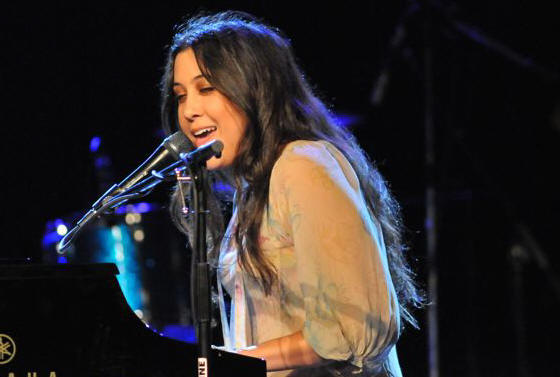 When
you released the single of “A Thousand Miles” a couple of years later –
it suddenly exploded. How surreal was it when these songs you made
started skyrocketing and you were all over the radio and MTV and
everything? Were you able to enjoy it with everything happening so
quickly?
When
you released the single of “A Thousand Miles” a couple of years later –
it suddenly exploded. How surreal was it when these songs you made
started skyrocketing and you were all over the radio and MTV and
everything? Were you able to enjoy it with everything happening so
quickly?
You know, I wasn’t. I wasn’t able to
enjoy that. It was a huge learning curve for me, being thrown out
there. My label at the time, they really had a team of people at the
label that really I think believed in me – or believed in the record as
a whole. They kind of went with a song… I think they did believe in the
record, but it was such a runaway song that it ended up being bigger
than everything. I felt very overwhelmed by that. Suddenly I’m sitting
on the Grammys stage and I’m like: What am I doing here? It was too
fast and I also felt very uncomfortable with the way that… I guess it
was being marketed, in a sense. I realized it was so out of my power.
It definitely was a feeling of helplessness in conjunction with this
kind of hypertension. It was a lot to deal with. I was able to weather
the storm, I think, pretty well. I’m grateful that it was a blowing
open of the door for me in many ways. Then, at the same time now, I’m
kind of having to remind the pop culture in a sense that I’m a
three-dimensional woman (laughs)
not just a series of notes.
The second album Harmonium did
not do as well, possibly in part because MTV deemed the single “White
Houses” too sexual, which seems kind of ridiculous to me.
Yeah, meanwhile they have people peeing
on each other in hot tubs and drunk out of their gourds. And they have
to censor the word “blood.” It was poetry. It was artfully done. That
was very disappointing. It was just disappointing in the sense of what
MTV was trying to sell the youth. I think in the end it’s really come
back and hit them in the face, because now they are scrambling. You
have to reflect pop culture in an accurate way and in an artful way.
You can’t just be a frat party. I mean, I’m a little bit on my soapbox
right now. That must have been the Red Bull. (laughs)
You left A&M and ended up at The Inc, which seemed an odd label for you
because they were previously known for hip-hop. Why did it feel like a
right fit for you and why did you want to work with [label head] Irv
Gotti?
Well, kind of like I was saying before,
my first two records, there were a
few people at my label that were really lovely and understood me, but
I was very much lost at that label. I was on a label with
No Doubt and U2 and Eminem. It was like, what am I doing there? So,
when I met Irv, I just felt this warmth and this subscription to my
aesthetic that I never felt before. I didn’t care that it was The Inc
or any of that. It doesn’t matter. I just needed that kind of
support. I was so lucky to get it then and I’m so proud that I was able
to get to the finish line on Heroes and Thieves
and release it. There was really no
question about working with him.
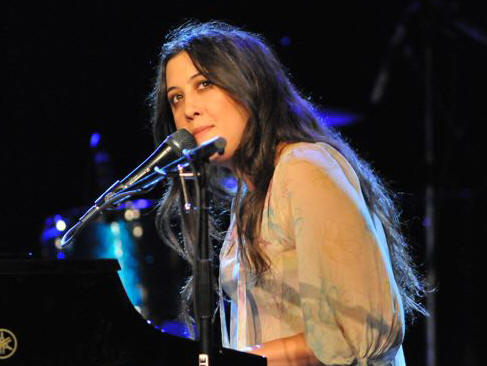 You
sing with Stevie Nicks on “The One.” How did that come about and what
was it like working with such a rock legend?
You
sing with Stevie Nicks on “The One.” How did that come about and what
was it like working with such a rock legend?
She’s magical. Wherever Stevie is she
sprinkles her pixie dust over everything. It’s really true. There’s a
reason that she has the aura that she has. It’s very reflective of who
she really is. She is this totally enchanted woman. I feel like stars
aligned in such a lucky way for me that I got to cross paths with her.
Not only did she really take me under her wing, but we’ve become really
close friends. I honestly don’t know if I would have gotten to the end
of Heroes and Thieves without
her friendship and presence in my life. I believe we’ll be friends
forever. There’s a really deep connection there. She’s taken me on the
road with her. I’ve been touring with her on and off for a few years.
She played a huge part in Heroes and Thieves.
She really propped me up so that I could get to the end of it. She
knows all of the pitfalls. All of the ups and downs that I deal with,
she’s dealt with. It’s hard to get through the ups and downs with
grace.
It seems like on the songs I heard for the new CD, when the songs turn
to love like “Hands on Me,” “More Than This,” “Home” and “Come Undone”
the relationships seem to working, even with their problems. As a
singer/songwriter, are you somewhat romantic? Do you find happy
relationships more interesting than troubled ones?
Oh, no. I mean I’m extremely
dreary. Perhaps I’m writing some positive stuff to try and prop
myself up. I don’t know. I was just writing lyrics and the
title of the song was like “Poets
Lie.” So I feel like in some ways you’re writing something
that you aspire to. But a lot of those songs are pretty tragic. The
one is about the notion of soul mates missing each other – which is
pretty horrible. And very true. Then, “Come
Undone” is about yearning
and not having a desire or a feeling of comfort. You never feel
anchored in the relationship that you’re in. That’s a pretty
uncomfortable feeling.
“Spring Street” told a very interesting story of family love. How
autobiographical is it to your own experience of moving away to New
York? I know I read in your bio you’re from Pennsylvania. I didn’t
recognize the name of your hometown. I’m in Philadelphia.
Oh, cool. My brother is going to
school in Philly. I’m from Milford. “Spring
Street” is like… Stevie
calls it “premonition song.” I’m doing this article in The New
Yorker, about Henry James. He was
very obsessed with death and would write about his own death. Then the
way it happened, he predicted his own death and the way it happened.
So, “Spring Street” is a combination of being
autobiographical about my mother in a sense and not understanding the
complexity of her feelings towards me when I left home when I was
fourteen. It’s kind of about the life cycle in a sense – then kind
of envisioning me moving out and somehow leaving the chaos of urban life
and understanding now. Who must
grown closer to my mother because of this phantom child I have in this
song. But obviously it’s not true. (laughs)
Yet. I don’t know what’s in store for me.
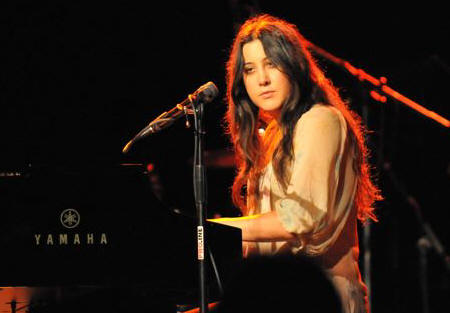 Heroes
and Thieves is almost a year old now. Have you started working
on the follow-up or are you more concerned with touring and getting the
current CD out there?
Heroes
and Thieves is almost a year old now. Have you started working
on the follow-up or are you more concerned with touring and getting the
current CD out there?
I’m first going to do this tour and
then first thing off, because yesterday I really started writing a lot
of lyrics. I wasn’t sure what my next project was going to be.
I
mean I know I’m going to do another record at some point, but probably
not until January. What I’d like to do this fall is… actually, I’m
going to the Arctic for two weeks and then I would like to find a film
project and start the ball rolling on scoring films, which is something
that I have been talking about for a while. I just can’t wait to start
to be a hired film scorer. Writing instrumental pieces of music is
really what comes easiest to me. I’m classically trained. I feel like
I would be able to use my roots and my training in an almost more
appropriate way. Cramming instrumental pieces and melodies into the pop
format is very different from doing an eight-minute piece.
I’ve noticed over the years that you have done a lot of guest work with
other artists covering classic songs – like “Big Yellow Taxi,” “Wishin’
& Hopin’,” “Put a Little Love in Your Heart,” “Everybody’s Gotta Learn
Sometime,” “Time Is On My Side”… even “Greensleeves.” As a songwriter
is it fun to do someone else’s song, or do you find that more difficult
to connect to?
I think it’s interesting, if it’s the
right song and you kind of reinterpret it. It allows the listener – and
even the writer that originally wrote it – to hear it in a new way.
That’s pretty interesting. It’s like silkscreen or something. You
already have the art and then you do a silkscreen. It’s changing the
palate. They are hit or misses. It’s hit or miss for most people.
I wrote a book about Tori Amos. I was just curious, as a pianist and
songwriter was she an influence? Do you have any feelings about her
work? I know early on you were compared to her a lot.
Yeah, I think her palates of color are
fantastic. That comes from her early classical training. She doesn’t
do just chunks of chords. I think that’s probably one of our
similarities. But, I don’t think so. Other than that we’re two women
who play the piano. I have a ton of respect for her. I’ve seen her
live. She’s wonderful.
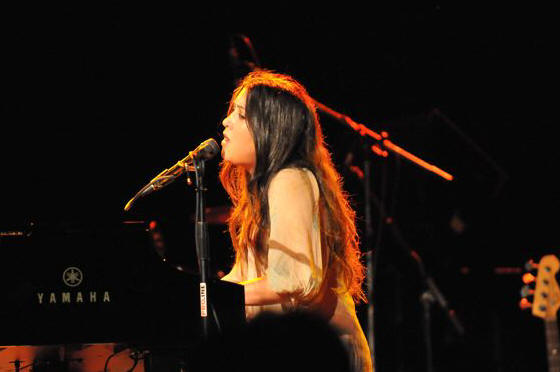 I was reading you also ran the New York marathon. What was that
experience like? What’s a bigger high, finishing a marathon or having a
really good crowd?
I was reading you also ran the New York marathon. What was that
experience like? What’s a bigger high, finishing a marathon or having a
really good crowd?
Well, certainly it’s less painful to
have a great crowd. I was dying when I got done.
Well, they say you get that endorphin rush…
It’s different. The marathon was more
of a personal test, to see if I would cower in the face of something
that’s really painful and difficult. Obviously, I had no idea if I
could really do it or not. I wanted to see how tough I was, I suppose.
With crowds it’s much more… connecting on more of a soulful level with
people and human emotions. When you really hit the crowd and you’re all
connected in the room it’s just so human and so comforting. You’re all
still in the same boat.
Do
you ever use the stage or your celebrity to promote causes you believe
in – whether sociological, charitable or political?
I do in a sense. With politics, that’s
a little trickier. I do this song on my second record, Harmonium,
called “Who’s
To Say?” which is very
much an attack on people who are intolerant – usually with
homosexuality. “Who’s
To Say?” I hoped would become an anthem for
people in relationships where your relationship is attacked by
strangers, which is so absurd to me. People can do what they like. The
pain that I’ve seen, especially having grown up in the ballet world,
most of the guys are gay and to see the struggle of my friends, their
families and their schools… it’s just ridiculous to me.
What would people be surprised to know about you?
I’m a bit enamored with vampires. I
don’t know, I think there are a million things. Even some of my closer
friends are sometimes confused by the things that come out of my mouth.
(laughs) I don’t know, I guess
the vampires and the darker side. Literature and life is almost more
intriguing to me.
What is your favorite movie or favorite book?
One of my favorite movies is
Labyrinth. I was haunted by David
Bowie for a good six years and could not get the tape out my brain.
Which is not necessarily a bad thing, but it was scary. (laughs)
Then, Jaws, for the soundtrack –
which is frickin’ brilliant. A film called Being There,
have you ever seen that movie?
Sure, with Peter Sellers.
Unbelievable. One of my favorite books
of all time is The Grapes of Wrath.
My publishing company is named after
Rose – her name was Rose of Sharon, a character in the book. A new
character I just fell in love with – have you ever read the book
The House of Mirth?
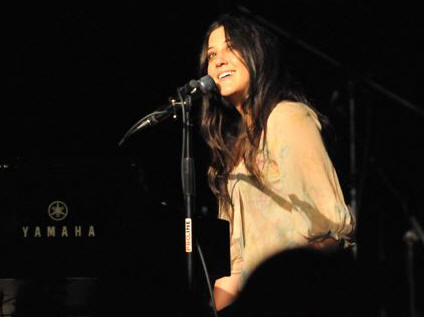 No,
I haven’t. I’ve heard of it.
No,
I haven’t. I’ve heard of it.
Lily Bart. Right now I’m totally in
Lily’s world and so, so haunted by that book. That’s a fantastic,
fantastic book.
I saw that Jane Magazine named
you one of the eleven people you’d most want to see naked. Is that the
oddest honor you’ve received? In some strange way, were you flattered?
Oh, people tell me that all the time.
I don’t know what you’re talking about. (laughs)
I hear that on a daily basis.
(sarcastically) I don’t think
Jane exists anymore. I mean,
that’s nice. I mean, who doesn’t want to look good naked? Isn’t that a
general desire?
Well, that's true. I’ve certainly never gotten that kind of honor… In the end, how
would you like people to see your music?
Well, I’m not there yet, but I’d like to hopefully
continue in my little spot in pop culture and have this classical and
melodic sensibility that I have. I hope it grows and becomes richer and
more complex and then is able to get even more instantly close to
hitting people in the way that music should. I don’t know, though,
because I’m so early on in my career. Stevie is a fantastic mentor for
me. Stevie has carved out her own path. I just hope I keep progressing
artistically and as a person in a way that comforts the people that are
listening and raises questions and gets to the heart of the matter.
Are there any misconceptions you'd like to clear up?
(ironically)
Oh, I’m deeply understood on a level beyond most singer
songwriters. Just kidding. I’m totally kidding. I think, if anything,
people always associate me with a pretty melody.
And you know what?
If
that’s the case, that’s fine. It’s better than being associated with an
ugly one.